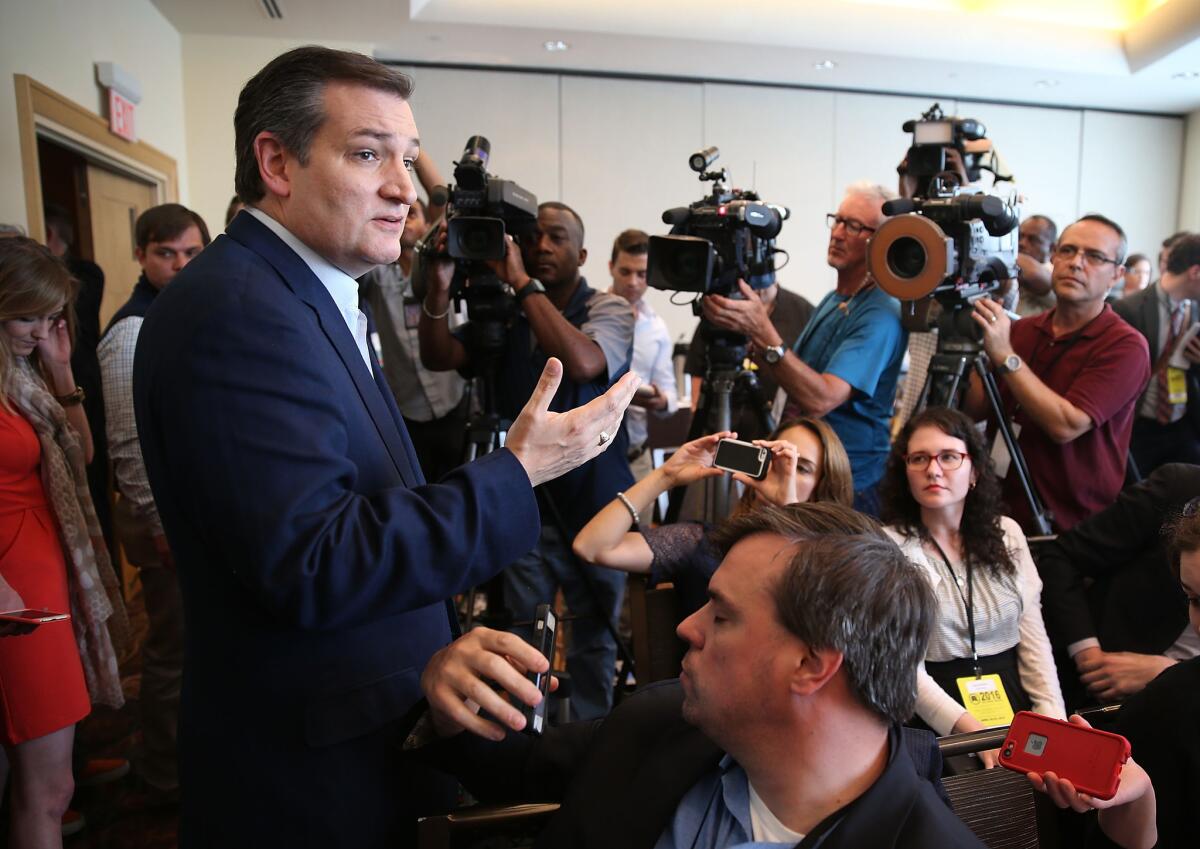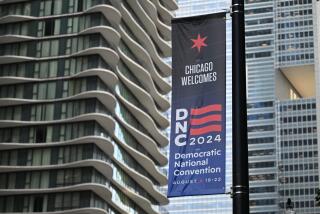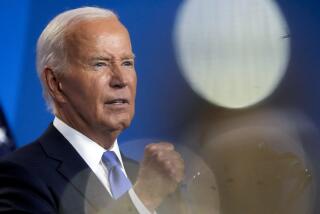Obscure GOP party meeting in limelight as turbulent convention looms

Presidential candidate Ted Cruz speaks with reporters at the Republican National Committee meeting in Hollywood, Fla. Party leaders say they don’t plan any substantial changes in convention rules.
Reporting from Hollywood, Fla. — A palm-tree-studded Florida beach resort is the unlikely new arena this week for the contentious GOP presidential race.
The heart of the party’s establishment — members of the Republican National Committee — is convening here for the group’s quarterly meeting, a typically cloistered affair. But in this unruly primary season, even the most insider of gatherings has been propelled into the public eye.
“There’s never been as much personal scrutiny by reporters and our constituents in any of our experiences,” said Shawn Steel, a national committee member from California.
The three-day gathering’s main event is a meeting on Thursday of the RNC’s 56-member rules committee, which helps shape the guidelines governing this summer’s nominating convention in Cleveland. The arcane rules have assumed an outsized significance with the prospect of a contested convention.
Whatever we propose, that’s it -- it’s a proposal. It’s a humble suggestion.
— Shawn Steel, a California member of the GOP rules committee
Still, the committee has already tamped down expectations of proposals out of the meeting that would substantially modify existing convention rules. The party is wary of appearing to help or harm any candidates by endorsing new nominating guidelines.
“We’re in a politically charged environment,” RNC Chairman Reince Priebus said on CNN on Sunday, adding that changing the rules now would be a bad idea.
That’s in part because the confab comes at an especially delicate time for the committee.
Republican front-runner Donald Trump has waged an escalating feud against his party, taking direct swipes at Priebus and denouncing GOP elites as having a “rigged system” that he says has imperiled his path to the nomination.
Priebus has scoffed at Trump’s complaints of an unfair process, noting that primary rules were long-established and should be well-known to prepared candidates.
But even if committee members were to endorse major procedural changes Thursday, it would not be a binding decision.
“Whatever we propose, that’s it — it’s a proposal. It’s a humble suggestion,” said Steel, a former chairman of the California GOP who now sits on the rules committee.
Committee members can make recommendations on convention rules, but the main authority lies with the convention rules committee, a separate body of 112 delegates who will be chosen by the individual delegations of every state and U.S. territory.
That committee, which will meet just before the July convention, can rewrite the rules on the nominating proceedings before presenting them before the full convention for approval.
The intrigue surrounding this week’s conclave underscores how much this turbulent Republican race hinges on the often-invisible nitty-gritty of the nominating process.
Trump continues to lead in primary votes and in notching delegates who will officially vote for the nominee on the first ballot at the convention. But he may fall short of capturing an outright majority of 1,237 delegates, raising the possibility of multiple rounds of voting in Cleveland.
Sen. Ted Cruz of Texas, meanwhile, has proved adept at shepherding supporters into delegate slots, ensuring a cadre of loyalists likely to support Cruz over Trump on a second ballot or beyond — when the bulk of delegates are no longer required to vote for the candidate who won their state’s primary.
Cruz’s successful maneuverings have prompted an outcry from Trump, who has sharply jabbed at his rival’s strategy as subverting the will of the voters.
“It’s a crooked system. It’s a system that’s rigged.... Nobody can take an election away with the way they’re doing it in the Republican Party,” Trump said Tuesday after his resounding win in the New York primary.
Beyond Trump’s public pronouncements, there were signs in Florida that his campaign hoped to thaw relations with the party elite. His top operatives were there briefing delegates.
Rivals Cruz and Ohio Gov. John Kasich themselves also flocked to Florida to huddle with party members.
Cruz, who has made railing against the “Washington establishment” a central tenet of his campaign, pushed back against the notion he was making a pilgrimage to the party elite. Rather, he portrayed the meeting’s attendees as “elected grass-roots activists from the states.”
“I am happy to go where the grass roots are, to ask for their support and to answer their questions at any and all times,” Cruz told reporters.
When not hobnobbing with presidential contenders, attendees were set to discuss obscure rules that rarely garner notice beyond political wonks. One example is a spat over the parliamentary order governing the convention.
Typically, the convention operates under the rules of the U.S. House of Representatives. One committee member proposed switching to a different protocol, Robert’s Rules of Order, which is more commonly used by civic groups to conduct meetings.
Such a move would give more authority to the delegates, instead of a powerful convention chair. Its proponent, Solomon Yue, said that would make the nominating process more transparent. Others say the protocol could pave the way for convention floor chaos or make it harder for the party to designate a compromise candidate should there be a deadlock.
But the RNC leadership signaled it would not want such a significant rules change to happen in such a politically fraught environment.
“Especially in the middle of the current primary contest, it is important that the RNC not take action that can be interpreted as attempting to favor one candidate or another,” wrote John Ryder, the RNC’s general counsel, in an email to rules committee members over the weekend.
“Major changes now are dangerous and not a good idea,” he added.
Yue, meanwhile, mused about how the minutiae of parliamentary procedure has suddenly captured national attention.
“Rules are such a boring subject — until someone tries to play games with rules,” he said. “Then it becomes an issue.”
Follow @melmason for more on California government and politics.
ALSO
Wrestling star Chyna found dead at Redondo Beach home
Global warming has made the weather better -- but don’t get used to it
Harriet Tubman is the next face of the $20 bill; $5 and $10 bills will also change
More to Read
Get the L.A. Times Politics newsletter
Deeply reported insights into legislation, politics and policy from Sacramento, Washington and beyond. In your inbox three times per week.
You may occasionally receive promotional content from the Los Angeles Times.











